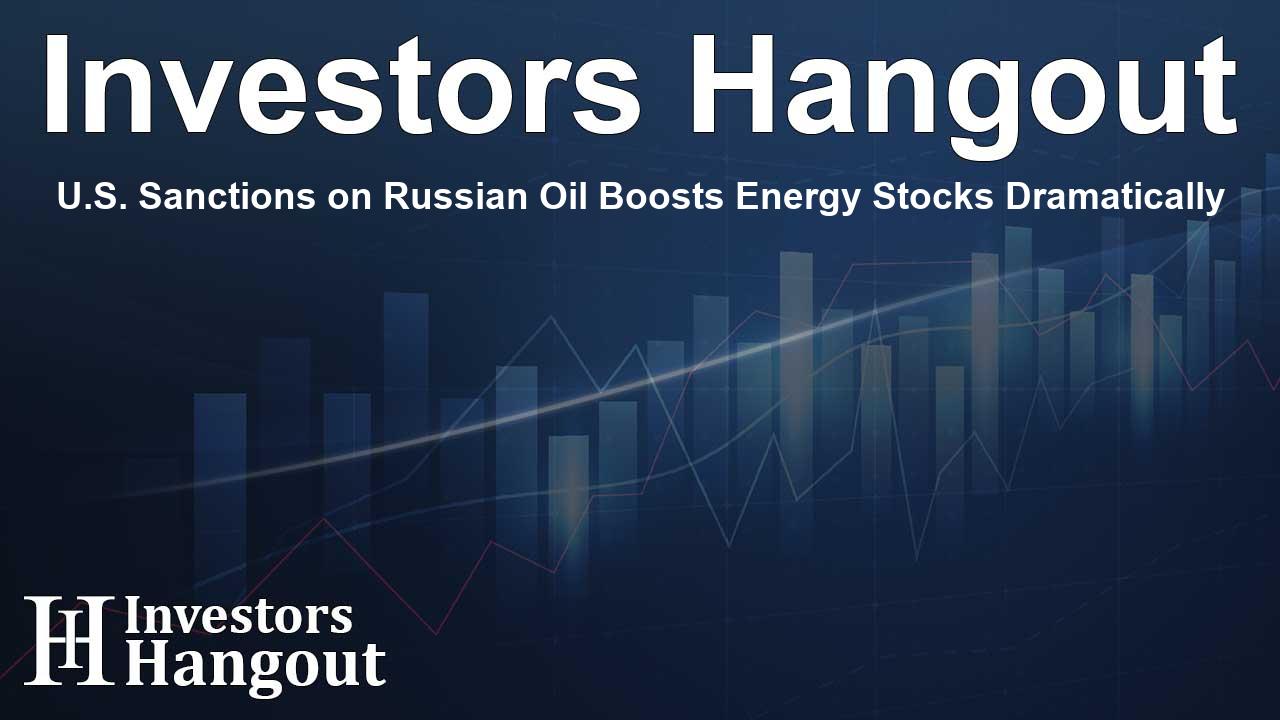U.S. Sanctions on Russian Oil Boosts Energy Stocks Dramatically

U.S. Sanctions on Russia Drive Energy Markets Higher
A fresh wave of U.S. sanctions targeting Russia's largest oil companies has revitalized energy markets, creating a significant spike in crude prices and propelling American oil stocks upward once again.
Details of the Sanctions and Their Implications
The U.S. Treasury recently imposed sweeping sanctions on major Russian oil producers, targeting Rosneft and Lukoil, as well as over 30 subsidiaries involved in oil exploration and distribution. This move aims to exert pressure on Russia amid ongoing geopolitical tensions related to the conflict in Ukraine.
Commentary from Financial Authorities
Treasury Secretary Scott Bessent emphasized the importance of these sanctions, stating, “Given President Putin's refusal to end this senseless war, Treasury is sanctioning Russia's two largest oil companies that fund the Kremlin's war machine.”
Impact on the Global Oil Market
The sanctions effectively freeze any U.S. assets tied to these companies and prevent American firms from engaging in business. This results in reduced Russian oil supplies in global markets, which is particularly impactful given the recent upward shift in oil inventories and prices.
Oil Prices React Positively to Sanctions
In direct response to the sanctions, West Texas Intermediate (WTI) crude futures surged significantly—over 5%—trading above $61 per barrel. This recovery follows a period where prices had dipped sharply, hitting lows that marked the weakest price point since April 2025.
Geopolitical Climate Influences Market Dynamics
Market analysts suggest that geopolitical factors are reemerging as crucial determinants of oil prices, significantly influencing supply expectations. As tensions rise, traders are recalibrating their forecasts for future disruptions in supply.
Energy Sector Gains Strength
The ripple effect of rising oil prices has translated into substantial gains for energy companies on Wall Street, particularly those actively involved in exploration and production activities. The Energy Select Sector SPDR Fund (NYSE: XLE), which captures the performance of major U.S. energy firms, recorded a 1.6% gain in premarket activity.
Highlighting Top Movers in the Energy Space
As the market reacts, several energy stocks have led the way with significant premarket gains:
- APA Corp. (NASDAQ: APA) saw an increase of 4.2% to $23.85.
- Occidental Petroleum Corp. (NYSE: OXY) rose by 3.1% to reach $43.04.
- Diamondback Energy Inc. (NASDAQ: FANG) surged 2.6%, trading at $146.02.
- ConocoPhillips (NYSE: COP) advanced 2.5%, reaching $89.55.
- Devon Energy Corp. (NYSE: DVN) climbed 2.4% to a price of $33.19.
- SLB N.V. (NYSE: SLB) moved up 2.3% to $35.72.
- EQT Corp. (NYSE: EQT) increased by 2.3% to $54.70.
- Valero Energy Corp. (NYSE: VLO) rose 2% to $165.15.
- EOG Resources Inc. (NYSE: EOG) gained 1.9% to trade at $108.27.
- Expand Energy Corp. (NYSE: XPD) saw a rise of 1.9%, reaching $106.41.
Current Market Trends
Despite the recent rally, the XLE ETF had only seen a modest gain of 1.7% year-to-date prior to this surge, making it one of the underperformers within the S&P 500 sectors.
Frequently Asked Questions
What prompted the recent rise in energy stocks?
Recent U.S. sanctions on Russian oil companies triggered a significant rally in energy stocks, as the sanctions reduced Russian oil supply in the global market.
Who are the major companies affected by the sanctions?
Rosneft and Lukoil, two of Russia's largest oil producers, along with their subsidiaries, are primarily affected by the sanctions.
What impact did the sanctions have on crude oil prices?
Crude oil prices surged more than 5%, trading above $61 per barrel following the announcement of the sanctions.
Which energy stocks are performing well currently?
Notable gainers include APA Corp (NASDAQ: APA), Occidental Petroleum Corp (NYSE: OXY), and Diamondback Energy Inc (NASDAQ: FANG).
How has the market responded to these geopolitical events?
The market has shown a tendency to respond positively to geopolitical risks, particularly when they signal potential supply disruptions.
About The Author
Contact Ryan Hughes privately here. Or send an email with ATTN: Ryan Hughes as the subject to contact@investorshangout.com.
About Investors Hangout
Investors Hangout is a leading online stock forum for financial discussion and learning, offering a wide range of free tools and resources. It draws in traders of all levels, who exchange market knowledge, investigate trading tactics, and keep an eye on industry developments in real time. Featuring financial articles, stock message boards, quotes, charts, company profiles, and live news updates. Through cooperative learning and a wealth of informational resources, it helps users from novices creating their first portfolios to experts honing their techniques. Join Investors Hangout today: https://investorshangout.com/
The content of this article is based on factual, publicly available information and does not represent legal, financial, or investment advice. Investors Hangout does not offer financial advice, and the author is not a licensed financial advisor. Consult a qualified advisor before making any financial or investment decisions based on this article. This article should not be considered advice to purchase, sell, or hold any securities or other investments. If any of the material provided here is inaccurate, please contact us for corrections.
